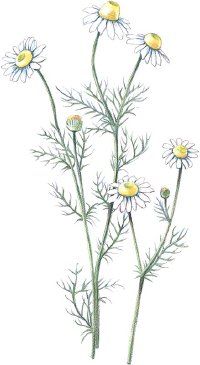Peter Rabbit's mother gave him chamomile tea when he was feeling ill, and maybe your mother brewed you a cup of this soothing herbal remedy to help ease your tummy troubles too. Chamomile is, indeed, an excellent choice for stomachaches.
Several different plants are called chamomile but not all belong to the Matricaria genus. English or Roman chamomile (Chamaemelum nobile, formerly called Anthemis nobilis), for example, is a different species, yet it shares many of German chamomile's chemical constituents and, therefore, many of its actions. Though they may have very different Latin names, if the plants have the same taste, color, and aroma as Matricaria chamomilla, they likely have a similar action.
Advertisement
Uses of Chamomile
The genus Matricaria is derived from the Latin matrix, meaning "womb," most likely because chamomile is widely used to treat such gynecologic complaints as menstrual cramps and sleep disorders related to premenstrual syndrome (PMS). Chamomile has been found to contain fairly strong antispasmodic and anti-inflammatory constituents and is particularly effective in treating stomach and intestinal cramps.
Chamomile, or more specifically, typically the tops gathered in the early stages of flowering, reduces cramping and spastic pain in the bowels and also relieves excessive gas and bloating in the intestines. It is often used to relieve irritable bowel syndrome, nausea, and gastroenteritis (what we usually call stomach flu). Chamomile is also an excellent calming agent, well suited for irritable babies and restless children. Moreover, most children tolerate its taste.
Chamomile also can help a child fall asleep. Chamomile is calming to adults as well, but don't hesitate to sip it throughout the day -- its relaxing effects do not interfere with activities such as driving a car or completing difficult tasks, as is the case with prescription sedatives. Chamomile is an ideal choice for those with ulcers or other stomach problems aggravated by anxiety. Muscle pain that results from stress and worry is another indication for chamomile. Twitching and tics in muscles may respond to chamomile tea or other chamomile medications.
Chamomile is valued as an antimicrobial agent. A German study found that the herb inactivates bacterial toxins. Small quantities of chamomile oil inhibit staphylococcal and streptococcal strains of bacteria. You can drink chamomile tea combined with other antimicrobials, such as thyme, echinacea, and goldenseal, for internal infections. You can use chamomile topically, too, to treat infections and inflammations.
In the next section, you will learn how to prepare chamomile for herbal remedies and some of the potentially dangerous side effects.
To learn more about treating common medical conditions at home, try the following links:
- For an overview of all of our herbal remedies, go to the main Herbal Remedies page.
- To learn more about treating medical conditions at home, visit our main Home Remedies page.
- One of the best things you can do for your health and well being is to make sure you are getting enough of the vital nutrients your body needs. Visit our Vitamins page to learn more.
This information is solely for informational purposes. IT IS NOT INTENDED TO PROVIDE MEDICAL ADVICE. Neither the Editors of Consumer Guide (R), Publications International, Ltd., the author nor publisher take responsibility for any possible consequences from any treatment, procedure, exercise, dietary modification, action or application of medication which results from reading or following the information contained in this information. The publication of this information does not constitute the practice of medicine, and this information does not replace the advice of your physician or other health care provider. Before undertaking any course of treatment, the reader must seek the advice of their physician or other health care provider.Before engaging in any complementary medical technique, including the use of natural or herbal remedies, you should be aware that many of these techniques have not been evaluated in scientific studies. Use of these remedies in connection with over the counter or prescription medications can cause severe adverse reactions. Often, only limited information is available about their safety and effectiveness. Each state and each discipline has its own rules about whether practitioners are required to be professionally licensed. If you plan to visit a practitioner, it is recommended that you choose one who is licensed by a recognized national organization and who abides by the organization's standards. It is always best to speak with your primary health care provider before starting any new therapeutic technique.
Advertisement
